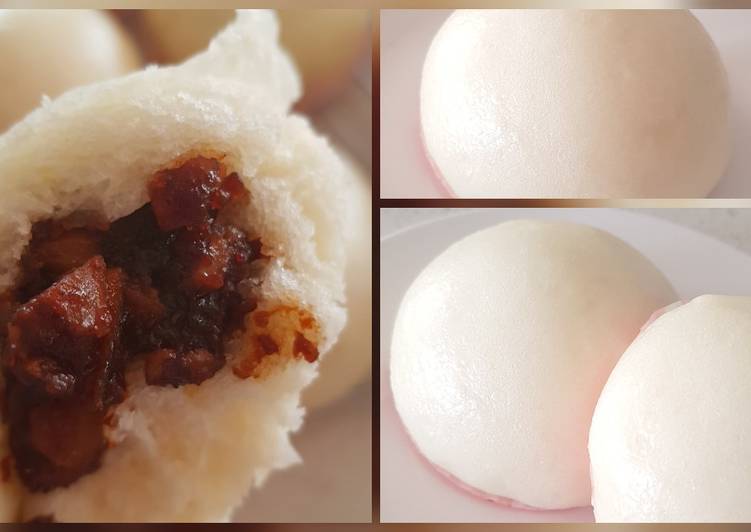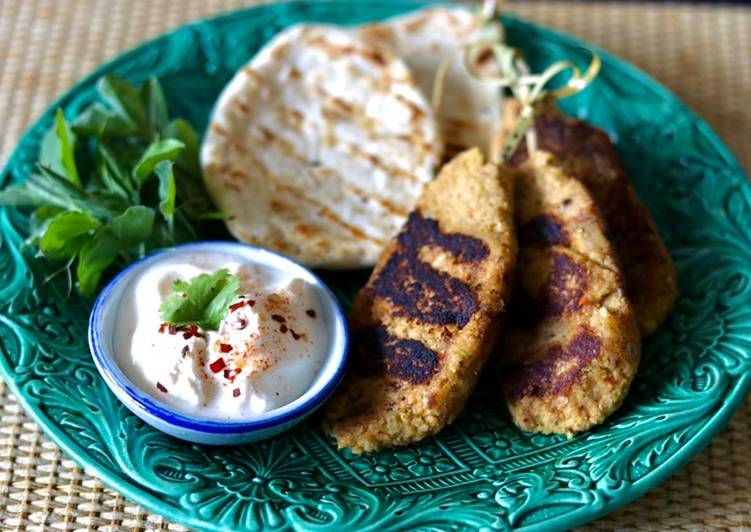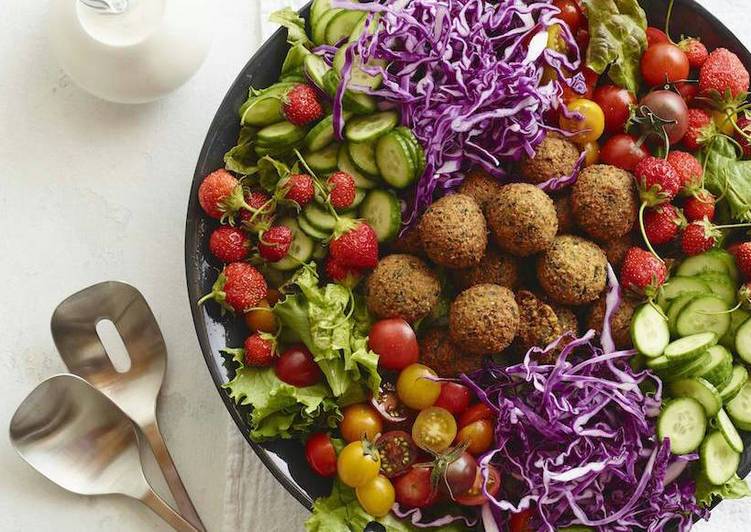
Hello everybody, it is John, welcome to our recipe site. Today, we’re going to make a special dish, steamed buns. One of my favorites food recipes. This time, I am going to make it a little bit unique. This will be really delicious.
These steamed buns are exactly like the ones I can buy at the chinese supermarket bakeries (T&T). They are slightly chewy and VERY light almost "airy". The larger sized buns were much easier to work with and much tastier.
Steamed Buns is one of the most popular of current trending foods in the world. It’s simple, it’s quick, it tastes delicious. It is enjoyed by millions every day. Steamed Buns is something which I’ve loved my entire life. They are nice and they look fantastic.
To begin with this particular recipe, we have to prepare a few components. You can cook steamed buns using 27 ingredients and 8 steps. Here is how you cook that.
The ingredients needed to make Steamed Buns:
- Prepare A. For the buns
- Make ready 265 ml water
- Make ready 25 ml vegetable/corn oil
- Get 50 g sugar (1/4 c)
- Take 500 g any low protein flour (7-9%)
- Make ready 1 1/4 tsp double acting baking powder
- Get 1 1/4 tsp dry instant yeast
- Prepare B. Filling 1 - vegetarian
- Take 400 g bok choy - finely chopped
- Get (Mix with 1/4 tsp of fine salt)
- Prepare 100 g fresh shiitake mushrooms
- Make ready (Washed. Drained. Finely chopped)
- Prepare 1 tbsp soy sauce
- Make ready 3 tbsp sesame oil
- Get Dash ground white pepper
- Make ready to taste Salt or chicken cube/granules
- Take B. Filling 2 - chicken char siu
- Take 350 g (or more) chopped chicken char siu
- Take (Char Siu recipe on previous post)
- Prepare 3 tbsp finely chopped yellow onion
- Take 3 tbsp cooking oil
- Make ready 3 tbsp oyster sauce
- Make ready 3 tbsp corn flour + 3 tbsp water
- Prepare 2 tbsp castor sugar
- Prepare 2 tbsp chinese cooking wine
- Get 1 tbsp sesame oil
- Take 1 tbsp dark soy sauce (or 2 tbsp - adjust)
Chinese steamed buns can be stuffed with various types of fillings or unstuffed. Those stuffed steamed buns are called as Baozi in Chinese (Bao Buns) and those without fillings are called as mantou. Mantou(馒头) is a basic staple in northern part of China and served in every places of China not just the northern part. Homemade char siu bao is much easier than you think.
Steps to make Steamed Buns:
- A. For the buns - Place ingredients in A (according to the order listed) into a bread maker. Use dough setting to knead & proof the dough. Note: this recipe here uses chicken char siu as filling; authentic taste of hawkers/restaurants steamed buns.
- If Bread Maker is Not Available, knead dough by hand. Combine flour, baking powder, yeast, sugar in a large mixing bowl. Whisk dry ingredients until well mixed. Make a well in the flour mixture, add water & oil. Mix well & knead to form a dough. Transfer dough onto a lightly floured surface. Knead until an elastic and smooth dough is formed (around 15-20mins). Then let rise for 1 hour.
- B. Filling 1. Vegetarian - combine the finely chopped bok choy with 1/4 tsp of salt. Allow to sit for 15mins at room temperature. Then divide it into 3-4 batches. Place each batch in the middle of a large muslin cloth & squeeze out its water content. Discard water or use this Pok choy water can be used to make green buns. Repeat the same with the remaining portions of the bok choy. Mix the rest of the filling ingredients into the squeezed bok choy until combined. Set aside.
- B. Filling 2. chicken char siu - in a frying pan, heat up cooking oil, sauté the onion until fragrant. Add chopped char siu & stir fry for 1-2mins until well mixed. Add in cooking wine, oyster sauce, sesame oil, sugar, dark soy sauce. Stir to mix for few minutes. Add corn flour mixture. Mix until well combined and all turn thick & sticky. Taste filling & adjust accordingly but do not worry about strong seasoning & taste as buns are plain in taste.
- Note: this recipe yields 16 small buns. When the dough is ready, divide into 16 portions. Each weigh 50g. Flatten each dough pieces. Wrap 1-2 tbsp of filling inside each rolled dough. Repeat the rolling & wrapping steps with the rest of the dough & filling. wrap each bun up neatly & lightly shape/roll into round ball. Avoid pressing buns hard when rolling them into smooth balls. Place each bun on each paper cup liner or a small piece of baking paper with its seam sides down.
- Rest the buns in warm mist for 40mins or until the dough look puffy.
- In the meantime, prepare the steamer- set water to boil for steaming later. Steam bun with medium heat for abt 15-20mins until done. The steam timing varies if multiple layers of buns are steamed. The layer that is closest to the direct steam will take lesser time-15mins to cook. When ready, remove the buns from the steamer & serve warm.
- Left over can be refrigerated or kept in the freezer with cling wrap & cover. Allow buns to cool completely at room temperature before freezing. Wrap each bun in small bag before storing in the freezer. To consume, steam until hot & serve. Alternatively, refrigerated buns can also be microwaved for 15-30sec.
Steamed buns: pockets of steamy goodness, just waiting for you to fill them with tender meats, pickled vegetables, fresh herbs, and ooey-gooey sauces. While the Chinese have been making mantou—steamed bread dough—forever, America's obsession with the buns can be credited to David Chang. The Momofuku magnate is pretty modest about the whole thing, however; in the cookbook named for his. Baozi (Chinese: 包子), or bao, is a type of yeast-leavened filled bun in various Chinese cuisines. There are many variations in fillings (meat or vegetarian) and preparations, though the buns are most often steamed.
So that is going to wrap it up for this special food steamed buns recipe. Thanks so much for your time. I’m confident that you will make this at home. There is gonna be interesting food at home recipes coming up. Don’t forget to save this page on your browser, and share it to your family, colleague and friends. Thank you for reading. Go on get cooking!


